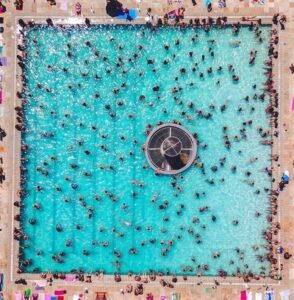You already know that the sun poses a particular threat to your eye health in the summer. What you may not know is that exposure to the sun’s UV rays is a year-round threat. In winter, this is known as snow blindness and it can be just as harmful to your eyes as the sun in the summertime.
Your eyes are susceptible to snow blindness due to the sensitivity of the cornea. When damaged, the cornea can become inflamed and irritated. It can take several hours for the effects of snow blindness to become noticeable. You can treat it with artificial tears and over-the-counter pain relievers. To prevent snow blindness, wear sunglasses year-round.
Why are Eyes Sensitive to Sunlight or Snow?
Sensitivity to sunlight and snow is caused by an eye health condition known as photokeratitis — photo meaning “light” and keratitis meaning “inflammation of the cornea.” Clear and dome-shaped, the cornea helps to focus light as it enters your eye to help you see. The cornea doesn’t have its own blood supply, so it needs tears to remain healthy and lubricated.
The cornea is also extremely sensitive due to the thousands of nerve endings that it contains. This makes it easy to become damaged, resulting in pain and discomfort. One common cause of corneal pain is overexposure to ultraviolet (UV) rays. Overexposure to UV light can result in what is basically a sunburn (photokeratitis) on the surface of your eye.
You may have experienced this during the summer when you weren’t wearing proper eye protection. However, the risk of photokeratitis doesn’t go away when the temperature drops. Instead, sunlight can reflect off of snow and enter your eye resulting in the condition.
The risk of snow blindness also increases at high altitudes where the sun’s UV rays are even stronger. This makes activities like hiking, skiing, or snowboarding in the snow particular risks for snow blindness.
Other activities that bring an increased risk of photokeratitis include:
- Water sports
- Tanning beds
- Welding
As with snow, water reflects light from the sun that can enter your eye, so it’s important to stay protected in the water. The same is also true for sand, making even a relaxing walk on the beach a risk for photokeratitis. Tanning beds create artificial UV light that can burn your corneas without eye protection.
Click here to learn why contact lenses with UV blockers are still no replacement for quality sunglasses!
How Long Does It Take to Develop Snow Blindness?
Snow blindness doesn’t occur immediately. In fact, it can take several hours before you feel the effects of a UV-damaged cornea. However, you’ll be quite aware that something is wrong when the symptoms start to set in.
Symptoms of Snow Blindness
- Eye pain
- Burning sensation
- Sensitivity to light
- Watery eyes
- Blurry vision
- Feeling like something is stuck in your eye
- Swelling
- Redness
- Headache
- Increased glare around indoor lights
Photokeratitis has been known to cause temporary color changes and even temporary blindness. However, these only occur in severe and rare cases. Make sure to contact us at Hardin Valley Eyecare & Optical if you experience these symptoms. Dr. Travis Thompson and Dr. Catherine Abbott can diagnose the problem and provide you with much-needed treatment.
How to Treat and Prevent Snow Blindness
When it comes to snow blindness, the majority of cases will heal on their own in a day or two. While they may not require medical treatment, it’s important to know how to handle a case of photokeratitis. This will help ensure that your recovery is as quick and comfortable as possible. Better yet, know what precautions to take so that you don’t have to worry about it at all.
Treating Snow Blindness at Home
Most cases of snow blindness are easily treated at home. If you wear contacts then the first step will be to take them out immediately. You can wear contact lenses again once your symptoms have gone away.
Relief from symptoms is the name of the game when it comes to snow blindness. Avoid sunlight and other bright lights until your eyes feel normal again. Wear sunglasses if you must go outside so that your eyes stay comfortable.
You will also want to alleviate any irritation and inflammation that goes along with photokeratitis. This can be done with moisturizing artificial tears from your local drugstore. For the best results, opt for one that doesn’t have any preservatives and is formulated for mild dry eyes. This will prevent any further sensitivity or blurry vision that can occur with thicker formulas.
Over-the-counter pain relievers can also be used to alleviate your symptoms. Just make sure to take them as directed and avoid any that you may be allergic to or experience any unwanted complications. Cold compresses can be used to reduce your symptoms, as well.
As for don’ts, make sure to not rub your eyes. This can aggravate your symptoms and actually make them worse. This works similarly to contact lenses and photokeratitis, so it’s important to avoid anything that will result in worsened symptoms.
Preventing Snow Blindness
While it’s good to know how to handle snow blindness if it occurs, it’s even better to know how to prevent it. You can easily protect your eyes with the right eyewear. Make sure to wear sunglasses that block 100 percent of UV rays or choose lenses with a rating of UV 400 or higher for the same protection. Look for these same factors when choosing snow goggles for outdoor activities such as skiing and snowboarding, as well.
To learn about the latest sunglass trends for 2022 and beyond, click here!
At Hardin Valley Eyecare & Optical, we offer a wide range of styles and brands guaranteed to compliment or even shake up your look. This includes the hottest brands such as:
- Ray-Ban
- Maui Jim
- Kate Spade
- Tiffany & Co.
- Georgio Armani
Possibly more importantly, you can pair your fresh new frames with UV-blocking lenses. This ensures that you get the best of both worlds: hot new frames that are as functional as they are stylish.
Are you looking for a year-round pair of sunglasses that offer as much protection as they do style? Contact us today to schedule your appointment!
The sensitivity of the cornea is what makes you prone to snow blindness. When damaged by the sun’s rays, you can experience inflammation, irritation, and redness. These symptoms can take several hours to appear. Snow blindness usually goes away on its own, but you can treat it with artificial tears and pain relievers. You can prevent it by wearing sunglasses year-round.
Hardin Valley Eyecare & Optical has been serving Knoxville since 2009. Dr. Travis Thompson and Dr. Catherine Abbott specialize in the diagnosis and treatment of a wide array of eye diseases, conditions, and problems and are committed to improving the quality of life in the Knoxville community through enhanced vision. Located at 10904 Spring Bluff Way, you can schedule an appointment online or give us a call at (865) 888-0892.





